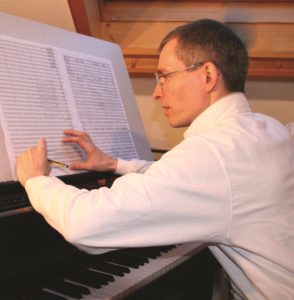Detrás de las siete montañas: Visita al compositor Wolfram Buchenberg en el Allgäu de Baviera
Conversación con Arne Reul.
La música de Wolfram Buchenberg se va consolidando cada vez más firmemente en el repertorio de numerosos coros. Próximamente aparecerá en el sello coral Spektral el primer CD con música coral a capella dedicado exclusivamente a él, cantado por “Cantabile” de Regensburg, bajo la dirección de Matthias Beckert. Conjuntos que estén a la búsqueda de literatura contemporánea de alto nivel la encontrarán en la música de Buchenberg, pues obras suyas como „Ich bin das Brot des Lebens“ (Soy el pan de la vida), „Von 55 Engeln behütet“ (Protegido por 55 ángeles), „Veni dilecte mi“ o „Vidi calumnias et lacrymas“ han encontrado mucho entusiasmo en el público. Algunos de los encantadores arreglos de canciones populares de Buchenberg, como “Kein schöner Land” (Ningún país más bello), se cantan ya en América y en Asia.
Acaso no sea una casualidad que el compositor nacido en Allgäu haya enriquecido la música coral principalmente en cuanto a la sonoridad, ya que la belleza de un panorama como el alpino puede, de alguna manera, ser trasladado al plano vertical de la música – allí pues, donde la superposición de las voces inspiran a Buchenberg refinadas y atrayentes sonoridades corales. El NEUE CHORZEIT (Nuevo Tiempo Coral) encontró a Buchenberg en Marktoberdorf, donde reside gran parte del año para dedicarse, con la necesaria concentración, a su trabajo compositivo.
Señor Buchenberg, muchas de sus obras son comisiones encargadas por coros. ¿Cómo comenzó eso?
El primer coro para el que escribí fue el “Madrigalchor” de la Escuela Superior de Música y Teatro de Múnich, en el que yo mismo canté durante 12 años. Sabía exactamente de lo que era capaz ese coro y lo aproveché al máximo. Más o menos en ese grado de dificultad me he mantenido desde entonces, es decir para coros de nivel o semi-profesionales.
El trabajo en conjunto directamente con los coros puede dar nuevos impulsos a la vida coral. ¿Cómo funciona esto? ¿Los coros o los directores de coros se acercan a usted?
Generalmente un director llega a mí y me solicita una partitura para su coro – a menudo para un concierto próximo. Si me interesa y tengo tiempo, averiguo qué clase de coro es y qué exigencias puedo pretender de él. Deseo llegar a conocer el coro ya que deberé componerle algo que él pueda cantar. Debo llegar a ser capaz de componerles a los cantores tan ‘en la garganta’ como para que no se vean sobre-exigidos ni sub-exigidos sino verdaderamente provocados. Normalmente voy hasta el límite superior de lo que el coro es capaz. Si exijo fuertemente a un coro, él deberá esforzarse, aprenderá y a la postre sentirá un tanto de orgullo.
¿Usted está presente en los ensayos?
Si existe la posibilidad viajo con gusto a los ensayos, porque entonces recibo retorno. Así puedo llegar a ver un poco dentro de la obra y averiguar dónde eventualmente ‘patina’ y donde los cantantes tienen dificultades. También es interesante para mí tener un “feedback” para obras futuras.
Muchas obras suyas son literatura sumamente reconfortante para los coros. Por una parte hay en su música esa contabilidad, donde los cantantes pueden verdaderamente entregarse al “melos”…
Pienso que en mi música continuamente existen puntos de unión con literatura coral más antigua. Yo quiero escribir una música que sea cantable en todo momento, no pretendo nada que sea incómodo o incluso dañino para la voz. Cuando compongo siempre pruebo todo personal-mente. Lo que al cantar no me exigiría a mí mismo, tampoco se lo exijo a los coros. Pero luego existen también técnicas que no se encuentran así en la música coral tradicional. Sin más, ya en cuanto a la sonoridad, que es diferente de lo que era hace 100 años. También en las conducciones de las voces, con sonidos que van separándose en distintas direcciones y donde cada cantor canta individualmente y es independiente de su vecino.
Luego aparecen pasajes en extremo exigentes rítmicamente.
En lo que respecta a la complejidad busco lograr un equilibrio. Si la armonía es difícil trato de simplificar – dentro de esa armonía – la conducción de las voces, para que igualmente sea realizable aun para no profesionales. Pues si me mantengo extremadamente complejo simultáneamente en cada nivel – rítmico, armónico, melódico – necesitaría de veras coros profesionales que no hagan otra cosa que cantar ese tipo de música. Mi anhelo es lograr de alguna manera una buena relación entre la dificultad de la música y su efecto. Una música puede muy bien ser difícil, pero deberá producir un efecto correspondiente. Una música puramente difícil y que no suena bien – ¿qué es eso?
Usted compone también para coros de niños. Tenemos por ejemplo, obras notables como „7 Zaubersprüche für Mädchenchor“ (“7 encantamientos para coro de niñas”), „Silere et audire“ o „Gulla, mille gullala bena“, obra con texto de fonemas.
No me agrada demasiado escribir para coro de niños, debo reconocerlo, porque es realmente difícil. Lo más fácil es escribir para coros profesionales pues, en principio, de ellos se puede pretender todo. En esos casos, dicho llanamente, puedo escribir como me viene en gana. Pero cuanto menos versados son los coros, tanto más difícil se vuelve la composición, incluso el serme fiel a mi mismo. Pues yo tengo ya una clara y definida imagen del lenguaje sonoro en mi mente. Escribir música para coros de niños, que sea atrayente y, a la vez, realizable es realmente algo así como la cuadratura del círculo.
Llama la atención que usted incorpora frecuentemente movimientos para el coro de niños – y al mismo tiempo hay piezas con ritmos muy diabólicos.
Pienso que demasiado a menudo los niños están sentados por ahí y que, por lo tanto, habría que ocuparlos físicamente. Los niños deben vivir hasta el agotamiento su impulso al movimiento y encuentro muy importante el ofrecerles ocasión para ello. Algunos chicos son apenas capaces de pararse en una pierna, otros encuentran grandes dificultades en coordinar sus movimientos corporales. Sin embargo pienso que no hay que subestimar a los niños. „Silere et audire“ tiene un texto latino proveniente de Anselmo de Canterbury. Si se les brinda a los pequeños un acceso a dificultades como esta, se les puede también requerir el canto de textos más difíciles. Por lo menos pueden captar algo del clima de esas obras. Creo que tales fases meditativas son tan importantes para los niños como la posibilidad de expresarse rítmicamente, como por caso, con la obra con lenguaje puramente rítmico „Gulla, mille gullala bena“.
Hablando de Anselmo de Canterbury: casi la mitad de su música coral es sacra. ¿Cuál es su relación con esto?
Existen buenos textos sagrados que me comunican algo y entonces, el ponerles música me resulta muy natural. Muchos de los textos que valoro son casi desconocidos como, por caso, del Meister Eckhart o del mismo Anselmo de Canterbury. A través de mi música ellos reciben un círculo más amplio de oyentes. Esto me resulta más interesante que componer una vez más un Magnificat.
Usted hace asimismo arreglos para coro de canciones populares. ¿Cómo calificaría esta tarea en el ámbito de su trabajo?
Actualmente no tengo el corazón muy metido en este punto. Por un lado lo hago gustoso porque amo el folklore y las canciones populares, pero en última instancia se trata de un trabajo artesanal que se realiza con mucho menos vacilaciones que una verdadera composición. Algunos de estos arreglos se hicieron para coros escolares y/o juveniles y esto sería, por decirlo de algún modo, mi servicio práctico a la humanidad (ríe). Pero reconozco que me alegra mucho que “Kein schöner Land” se cante tanto. Es muy posible que haya gente que me conozca solamente por esta canción. A veces pienso en cómo se habrá sentido Carl Orff por el hecho de que la gente conociera solamente su “Carmina Burana”. ¡Es terrible! ¡Cuando dejas tras tuyo un trabajo de toda la vida y resulta que solamente es reconocida una sola obra! Espero que no me pase eso con “Kein schöner Land”… Pero tanto si lo canta un coro de Japón, Inglaterra o Corea, lo importante en realidad para mí es solamente que lo canten bien. Aunque en cuanto al idioma haya que contemplar algunos pasos en falso…
En el fonto, los arreglos de canciones populares ofrecen a los coros la oportunidad de acercarse a la música coral a través de una obra familiar.
Dado que se conoce ya la melodía se mitiga un poco el temor de entrada. Pero, por otra parte: siempre se dice que la gente tiene miedo ante la música contemporánea. ¡Yo tengo la experiencia de todo lo contrario! Heche una ojeada a los programas del Concurso de Coros de Cámara de Marktoberdorf – muchos esperan que se cante música coral contemporánea y, cuando no es así, la gente está desilusionada. Cuando la música está bien interpretada se puede causar una impresión mucho mejor con obras contemporáneas que con obras antiguas conocidas. Estoy muy seguro de que la calidad de un coro mejora cuando se ocupa de la música actual.
Su obra coral más reciente, “Tombeau de Josquin Desprez” es para coro a 16 voces.
Se trata de una obra que comencé por iniciativa propia. Tropecé con el texto y entonces quise elaborar una pieza a 16 voces con él. Pero cuando no se tiene una fecha de estreno una obra así suele quedar descansando durante 10 años… Cuando después llegó el pedido de una obra por parte de Martin Steidler, del Ensemble Heinrich Schütz de Vornbach, dije que lo haría si aceptaba esta obra coral a 16 voces, que por fin quería terminar de componer. Que a la postre la obra fuera estrenada conjuntamente con el Coro Via-Nova de Múnich fue verdaderamente una combinación ideal.
¿Qué significa para el manejo del sonido componer a 16 voces?
Cuando se escribe para un coro a 16 voces, ¡lo primero es incorporar muchas más pasuas! (ríe). No es posible componer continuadamente a 16 voces. Prefiero utilizar en determinados lugares, a conciencia, la ocasión para hacer cantar a todas las voces juntas, como medio para un crescendo. Se tiene además la chance de distribuir con más fuerza el desarrollo musical entre varias voces. Así una obra para coro puede llegar a ser incluso más liviana si es tratada a más voces, pues una voz, por ejemplo, no necesita dominar un salto difícil, ya que lo hará la voz siguiente.
Esta obra tiene niveles sonoros fascinantes y es al mismo tiempo una música muy emocionante.
¡Eso espero! (ríe). Los 100 cantores y cantoras de estos dos coros se sintieron muy impresionados. Cuando tal cuerpo sonoro en un momento, donde verdaderamente hay 16 voces, canta simultáneamente y luego se diluye, genera en verdad una increíble energía sonora. Pero si esto lo cantara un coro notablemente más chico, el mismo debería ser de enorme calidad para llegar esa cantidad de sonido.
¿Está allí para usted la fascinación de escribir a muchas voces?
¡Es la voz en sí! Nada puede mover tanto a otras personas como la voz con sus posibilidades expresivas. Ya el mero hecho de cantar se dirige naturalmente a alguien que está enfrente. Esto es lo que tiene la voz que supera a los instrumentos. Estamos ahora hablando, nosotros dos – esto sucede a través de la voz. Al mismo tiempo se intercambia mucha información inconciente, por ejemplo situaciones de tensión. Muchas veces ni me doy cuenta de cómo hablo ni en qué tonalidad lo hago, pero continuamente ejerzo con eso una influencia en otros o yo mismo resulto influenciado. Creo incluso que la voz puede tener un poder sanador, simplemente al oírla. Cuando uno escucha a determinadas personas uno siente bienestar, más allá de lo que estén diciendo – solo por la forma en que hablan. Eso tiene un poco de calidad terapéutica.
Publicado en NEUE CHORZEIT (Nuevo Tiempo Coral), Mayo de 2012
Wolfram Buchenberg, nacido en 1962 en Oberallgäu, es de los más prolíficos compositores para música coral de Alemania. Alrededor de la mitad de sus obras corresponden a música vocal. Buchenberg reunió sus primeras e importantes experiencias musicales en los grupos corales e instrumentales del Gymnasium de Marktoberdorf. Posteriormente estudió música escolar y composición en la Escuela Superior de Música y Teatro de Munich, donde actualmente él mismo enseña dirección de ensembles y práctica escolar de piano. Con el afamado Madrigalchor de la Escuela Superior, al cual perteneció durante muchos años como cantante, celebró Buchenberg su primer éxito importante en composición: en 1993 este coro ganó el Primer Premio de la categoría Música Coral Contemporánea, en el Certamen Internacional Coral „Let the peoples sing“ de la BBC en Londres, con sus obras „Beschwörung“ (Conjuro) y „Störung“ (Molestia) especialmente compuestas para el coro. Desde entonces muchos coros se interesan por el compositor y le encargan obras. A través del estrecho trabajo en conjunto con los ensembles, el artista ha logrado obras fuertemente expresivas que resultaron exitosas en la praxis musical de numerosos coros vocacionales de alto nivel. Buchenberg escribe música moderna y exigente que nunca se desborda hacia lo teórico y que a menudo libera una experiencia corporal y fuertemente emotiva. Email: wolfram.buchenberg@gmx.de
(Click on the images to download the full score)
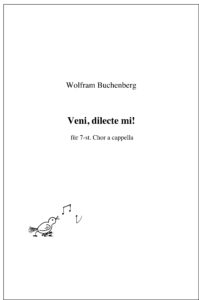
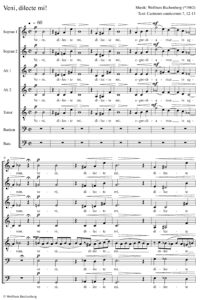
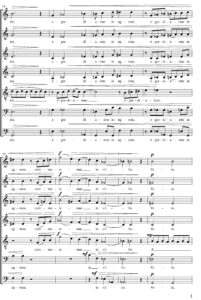
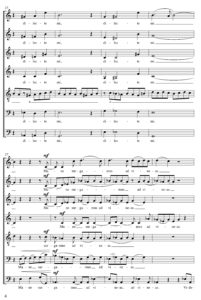
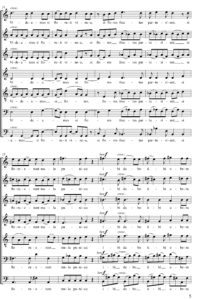
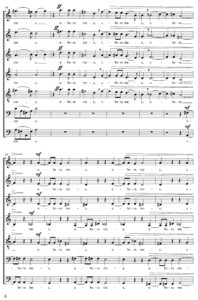
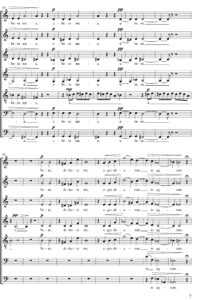
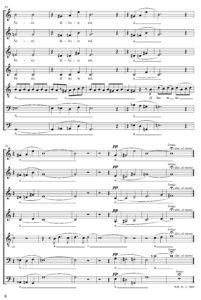
Traducción Bernardo Moroder, Tandil – Argentina
Edited by Graham Lack


